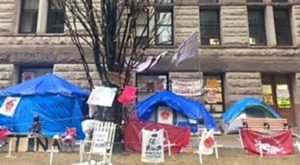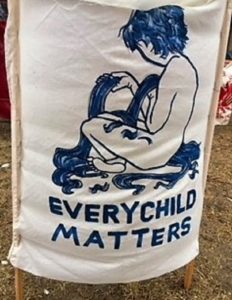Tkaronto’s Soaring Eagles: a conversation with youth movement leaders

Remembering Tina Fontaine and Colten Boushie, the youth-led Soaring Eagles Camp and Vigil is fighting injustices faced by Indigenous peoples of this land.
By Nicole Latulippe with contributions from Meagan Dellavilla and Nasreen Hussain
A month into the occupation of the front lawn of the provincial courthouse at Old City Hall, downtown Toronto, members of York University’s Indigenous Environmental Justice Project sat down with Tkaronto Soaring Eagles Camp and Vigil youth activists.
Inspired by the Soaring Eagles Camps in western Canada, the aim is to engage with community, have conversations, and advocate for change to the justice and child-welfare systems in Canada.
Over cups of Sweet grass tea, Creedence McComb, Caleb Woolcott, Billy Lester, and Tyler Bryan shared what motivates their work, their visions for justice, and how to support the youth-led movement.
“The court system has to change. It has to be a system that includes everyone. It cannot exclude people or show favoritism,” offered McComb, an Anishinaabe, Mohawk, and James Bay Cree from the Chippewas of Nawash First Nation. “The justice system should include Indigenous law practices—the Great Law of Peace, for instance.”
“I have seen segregation in my lifetime; it is still happening right now,” explained Bryan, who grew up in Forest Ontario near Ipperwash where Dudley George was fatally shot by police in the 1995 reclamation, and where tensions still run high.
To dismantle systemic racism and colonial violence, work at the Soaring Eagles Camp includes relationship building and everyday practices that create more inclusive and equitable communities.

“I want to see community being built,” voiced 16-year old Woolcott, who grew up in Toronto and holds space at the camp after school and on weekends. “I think the courthouse that we’re sitting outside of is a pretty unhealthy kind of community, if you can even call it that. It’s a system that’s built to drive people apart and to divide and conquer. And so, to take space back from that system and to build our own relationships, our own working relationships so we get stuff done together, is pretty amazing and inspiring. That’s my biggest goal.”
Youth stressed the importance of listening, acknowledging, and learning from the Elders, activists, and other community members supporting the Camp.
“There is value in being uncomfortable,” added Woolcott.
The key to moving relations and organizations beyond current colonial relations is to “really think, read, learn face-to-face, and be part of things that will help you learn and practice” non-Western systems and practices.
Part of this includes a focus on holistic conceptions of justice, as well as the leadership of Indigenous women, including Ezra Green and Koryn John who started the Toronto Camp and the other women who regularly hold space at the Camp.
Justice for Missing and Murdered Indigenous Women, the child-welfare system, Tina Fontaine and Colten Boushie cannot be separate from other injustices, including the destruction of lands, waters, and food sovereignty. Lester envisions justice as access to healthy foods, while Bryan added, “clean water for everyone in Canada”.
What is needed to support the youth-led movement?
“People are bringing food, gift cards, some youth are coming in during the day and offering support. But mainly what we need is more bodies: people coming and groups coming out here to join us, because we want it to be an inclusive space,” said McComb. “Not just Indigenous youth, but all youth, from all walks of life to come out here because it’s not just us facing these systemic issues.”
He pointed to the impact youth activism is currently having in the United States and to the work of Black Lives Matter to initiate critical conversations and change.
Honouring his mother and her decades of Indigenous and environmental activism, Lester added, “one person can make a difference; if they do something then we have a collective group of people doing that.”
“I want everyone to get up from being a keyboard warrior and come out,” said Bryan. “We’re at Queen subways station, at the Eaton Centre. You know where we are. It’s easy to get here. Everyone’s welcome. Come out and have a conversation with us. Meet the people who are here, and if you want to get involved, just get involved. Come talk to us. Come see what we’re doing. Anything helps. Share things on social media. Listen, that’s the best thing.”
The Indigenous Environmental Justice (IEJ) Project aims to develop a distinctive environmental justice framework that is informed by Indigenous knowledge systems, laws, concepts of justice and the lived experiences of Indigenous peoples. For more information, visit: http://iejproject.info.yorku.ca/
The first Soaring Eagles Camp was set up by Darla Contois on February 22nd at the Manitoba Legislature after the acquittals of Raymond Cormier, who was charged with second-degree murder in the death of Tina Fontaine in Winnipeg, and of Gerald Stanley, who was charged with second-degree murder in the death of Colten Boushie in Saskatchewan.
The Soaring Eagles Camp can be found online:
Facebook: Soaring Eagle’s Camp @sectkaronto
Twitter: @SECTkaronto
Instagram: soaringeaglescamp
Email: sectkaronto@gmail.com (for e-transfer donations)
Or by using these hashtags: #Bringourchildrenhome #justicefortina #justiceforcolten


